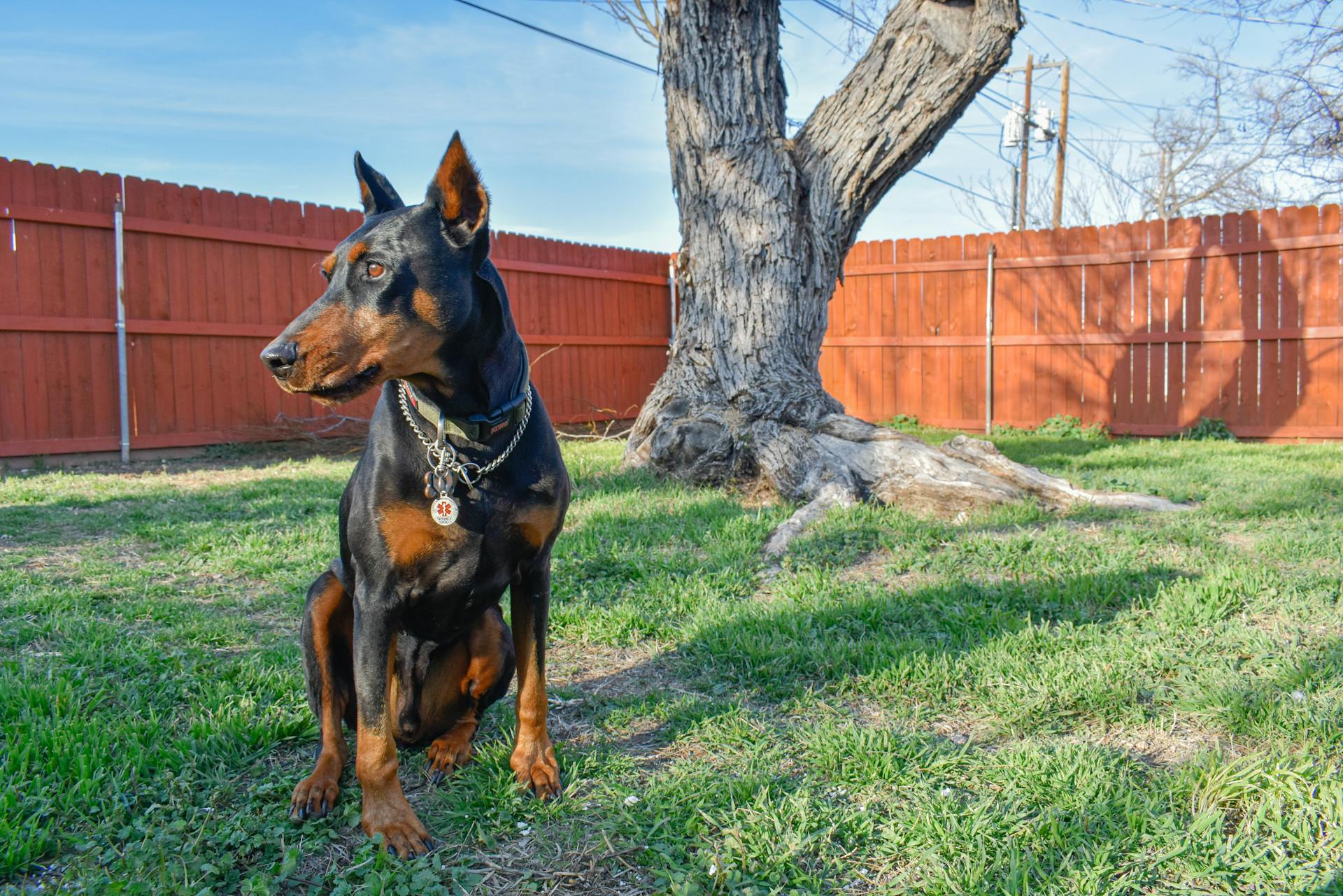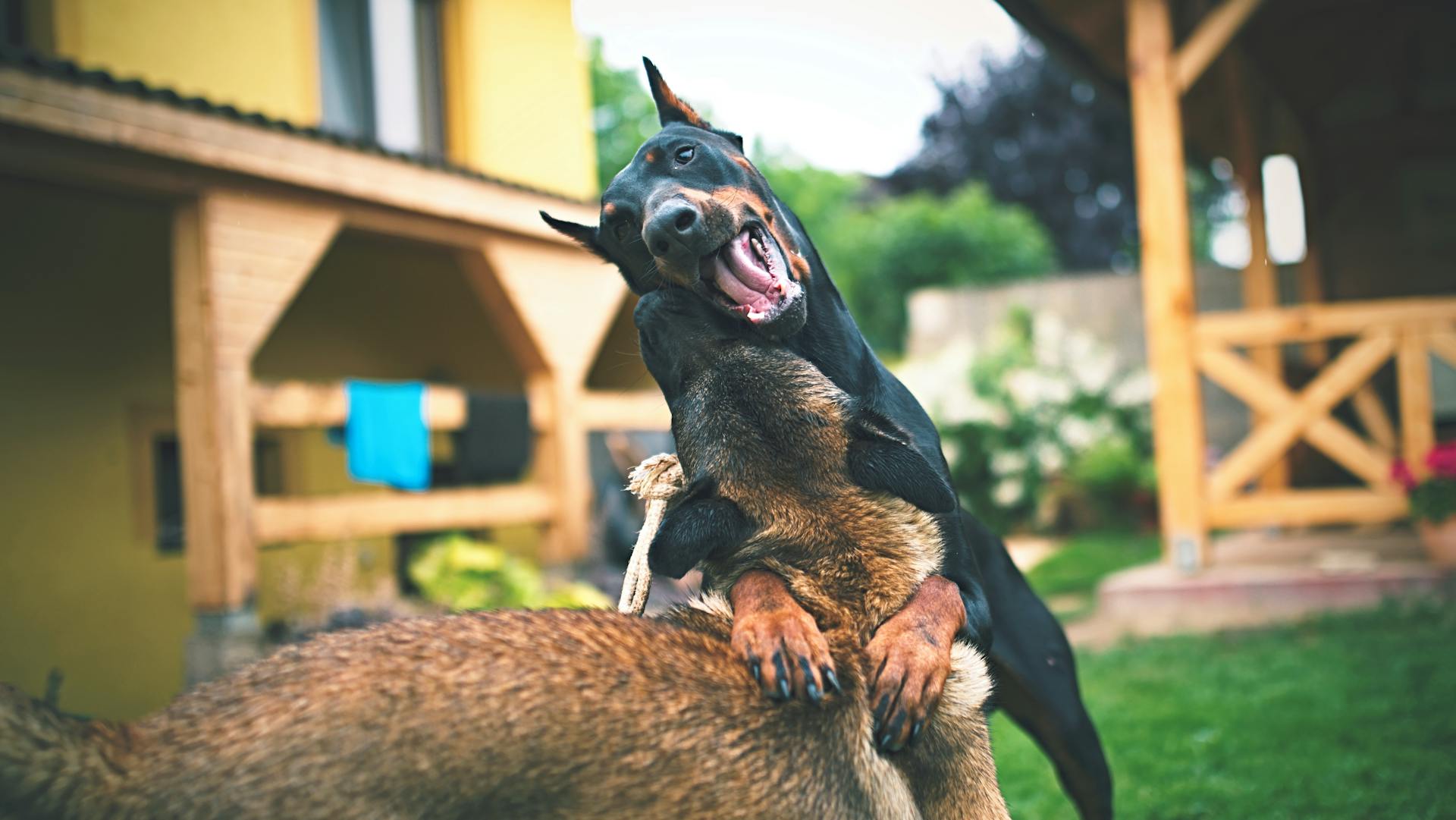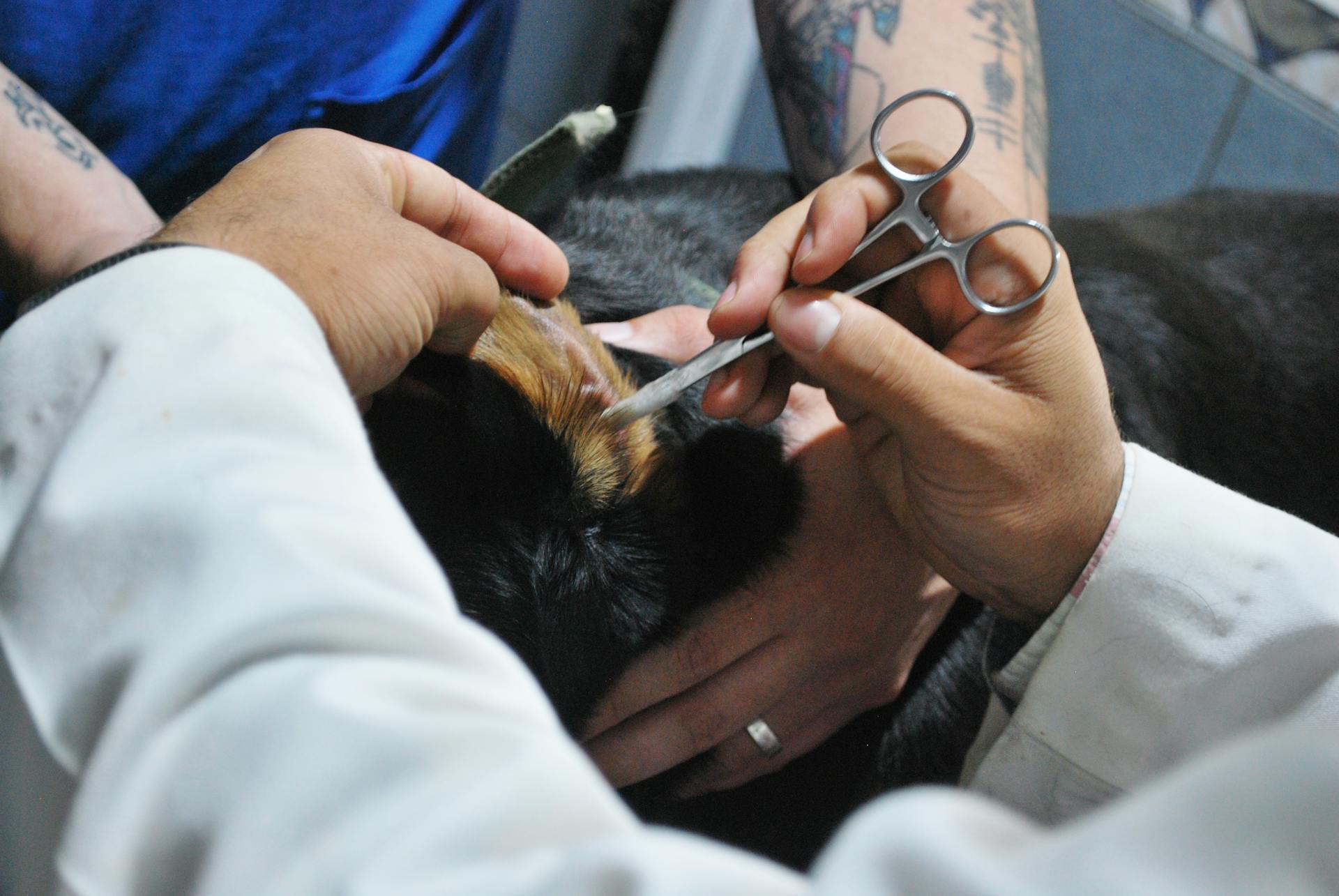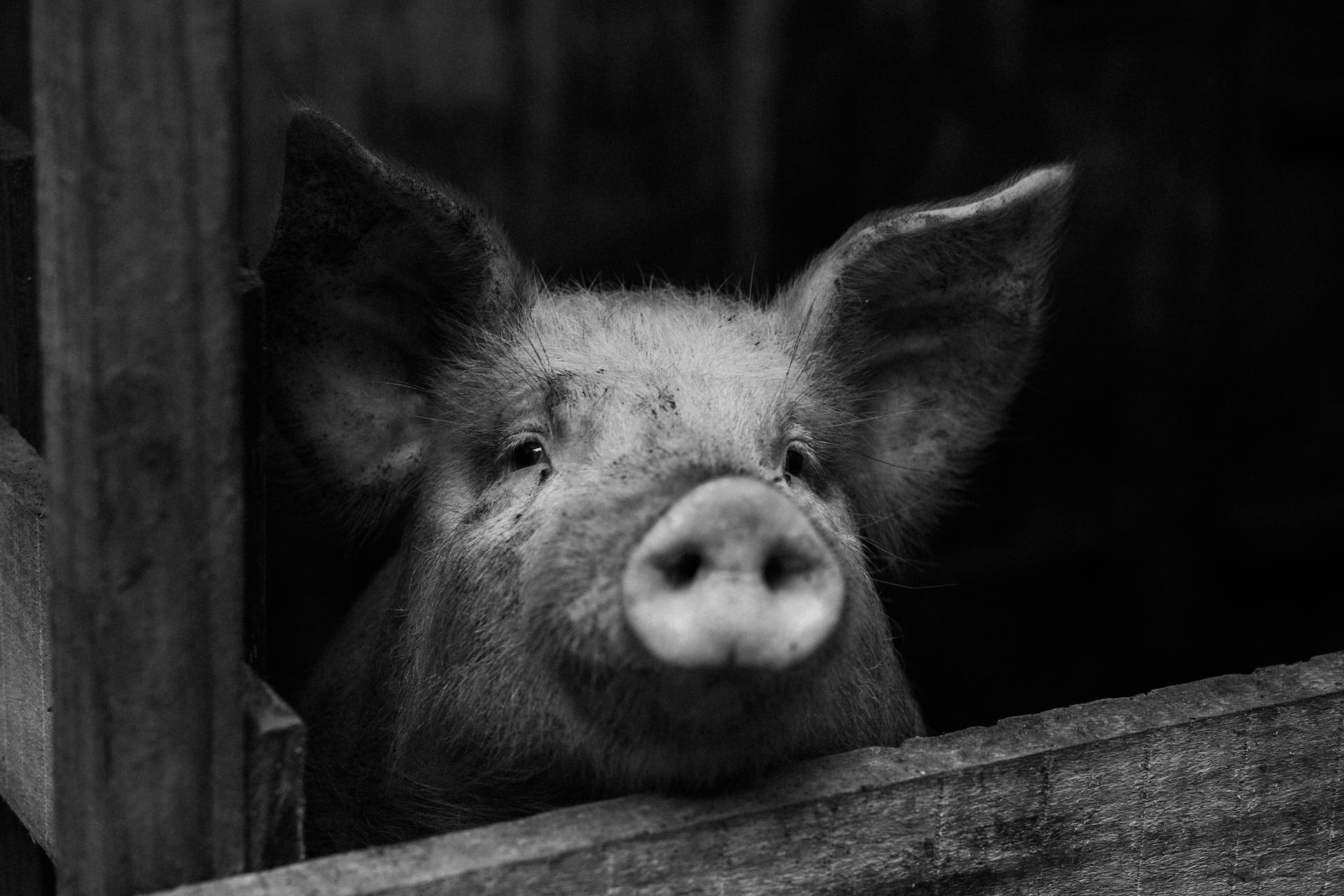
Raising a Doberman Pinscher without cropping their ears is a growing trend, and for good reason. This practice is on the rise due to concerns about animal welfare and the potential health risks associated with ear cropping.
Ear cropping can lead to chronic pain, infection, and scarring, which is a major concern for many dog owners. The American Veterinary Medical Association (AVMA) has also stated that ear cropping is a cosmetic procedure that is not medically necessary.
Not cropping a Doberman Pinscher's ears can also have benefits for the dog's overall health and well-being. By leaving the ears intact, owners can help prevent the risk of chronic pain and infection that often comes with ear cropping.
Broaden your view: Doberman Pinscher Health Issues
Arguments Against Ear Cropping
Ear cropping is a procedure that's been debated among dog owners and veterinarians for a long time. It's considered a cruel and unnecessary process for everyday pet owners.
Many veterinarians now refuse to crop ears and dock tails for dogs not participating in Kennel Club dog shows. This is because the procedure is not medically necessary and can be painful for the dog.
Ear cropping in modern times is almost never medically necessary. It's usually only advised in cases of severely damaged ears from accidents, dog attacks, or medical conditions.
There are no medical benefits to ear cropping, despite what some people may claim. In fact, the American Kennel Club's breed standard for Dobermans includes cropped ears, but this only applies to dogs shown in breed-conformation dog shows.
The procedure can be painful and may not be successful in the short or long term. It also poses a higher risk of infection or complications.
Here are some of the potential drawbacks to getting your Doberman's ears cropped:
- Higher risk of infection or complications
- Painful procedure
- May not be successful in the short or long term
- Not medically necessary
- Can be considered cruel and unnecessary
Doberman Pinscher Characteristics
Doberman Pinschers are incredibly loyal dogs who form deep bonds with their humans, often described as "velcro dogs".
They're intelligent and alert, but can be prone to separation anxiety and nervousness around strangers if not properly socialized and handled.
Doberman Pinschers are high-energy dogs that require a lot of attention and exercise, making them best suited for owners with dog experience and plenty of time to dedicate.
Their loving and cuddly nature makes them excellent companions, but they can be mouthy or skittish around younger children who don't understand dog boundaries.
With proper training and routine from an early age, Doberman Pinschers respond well and make excellent working dogs, utilizing their curious and tenacious nature.
Pinscher
The Pinscher part of the Doberman Pinscher's name is a nod to its origins as a Pinscher breed, a group of dogs known for their hunting and guarding abilities.
Doberman Pinschers are large dogs, standing 24–28 inches tall at the shoulder.
Their loyal nature means they form deep bonds with their humans, often becoming "velcro dogs" that stick by their owner's side.
Doberman Pinschers are intelligent and trainable, making them excellent working dogs.
They can be prone to separation anxiety and nervousness around strangers, but with proper handling and training, these issues can be managed.
Some Dobermans can be mouthy or skittish around younger children who don't understand dog boundaries, so it's essential to socialize them well.
Their high energy levels mean they require an owner with experience and plenty of time to dedicate to this canine.
Better for Guard Work
The Doberman Pinscher was originally bred for guard work, and its unique characteristics make it well-suited for this role.
Having cropped ears was a deliberate choice by the breed's creator, Karl Friedrich Louis Dobermann, to give his dogs an advantage in protection work. This allowed one less hand-hold for an attacker to grab onto.
The natural appearance of a Doberman's ears, which are shorter and lay back over the head, provides a similar benefit to cropped ears. This reduces the risk of ear damage during a conflict.
This distinctive appearance also helps to identify a Doberman as a breed, which can deter potential attackers. A Doberman's alert appearance can be a powerful deterrent, making it a valuable asset for guard work.
On a similar theme: Doberman Pinscher Docked Ears
Health and Welfare
Doberman Pinschers are generally healthy dogs, but they can be prone to certain health issues, such as bloat, hip dysplasia, eye issues, and heart problems.
Some of these health issues can be severe and require close monitoring. For example, progressive retinal atrophy can lead to blindness.
Doberman Pinschers can also be affected by Von Willebrand's disease, a clotting disorder, and hypothyroidism, a condition where the thyroid gland doesn't produce enough hormones.
In addition to these health issues, Doberman Pinschers can also be prone to heart problems, such as cardiomyopathy.
It's essential to work with a reputable breeder or rescue organization to ensure you're getting a healthy Doberman Pinscher.
Here is a list of some common health issues in Doberman Pinschers:
- Bloat
- Hip dysplasia
- Eye issues (e.g. progressive retinal atrophy)
- Von Willebrand’s disease (a clotting disorder)
- Heart issues (e.g. cardiomyopathy)
- Hypothyroidism
Cruel
Ear cropping a Doberman for cosmetic reasons is considered cruel and unnecessary in many parts of the world.
The American Veterinary Medical Association (AVMA) released a statement in 2008 advising that their organization is opposed to this procedure.
The AVMA opposes ear cropping and tail docking of dogs when done solely for cosmetic purposes.
The AVMA encourages the elimination of ear cropping and tail docking from breed standards.
Some veterinarians use modern pain management techniques to make the procedure as painless as possible, including full anesthesia and pain medicine after the procedure.
Laser ear cropping is a newer technique that drastically reduces the healing time.
In my experience, Dobies have no problem handling the procedure itself, and I'm always relieved when I see how happy and chipper my Dobermans are right after the procedure.
The pain medication is likely still in their system at the point when I first see them after surgery.
A different take: Doberman Ear and Tail Cropping
Health
As a responsible dog owner, it's essential to be aware of the potential health issues that can affect your Doberman Pinscher.
Bloat is a serious condition that can be life-threatening if not treated promptly. It's a good idea to monitor your dog's eating habits and prevent overeating.
Hip dysplasia is a common health issue in Dobermans, which can lead to arthritis and mobility problems.
Eye issues, such as progressive retinal atrophy, can cause vision loss and blindness.
Von Willebrand's disease is a clotting disorder that can cause excessive bleeding during surgery or injury.
Some Dobermans may be prone to heart issues, including cardiomyopathy, which can lead to heart failure.
Hypothyroidism is a condition where the thyroid gland doesn't produce enough hormones, causing weight gain and skin problems.
Here are some common health issues to watch out for in Dobermans:
- Bloat
- Hip dysplasia
- Eye issues (e.g. progressive retinal atrophy)
- Von Willebrand’s disease (a clotting disorder)
- Heart issues (e.g. cardiomyopathy)
- Hypothyroidism
Finding and Owning a Doberman Pinscher
If you're set on getting a Doberman with its natural floppy ears and long tail, a quick Google search can yield some promising results. Simply type in "natural-ear Doberman breeder near me" and you'll likely find a few breeders or forums to connect with.
Connecting with other Doberman enthusiasts and breeders they trust can be a great way to find a reputable breeder.
A quick online search can bring up a handful of results, including breeders and forums where you can learn more about the breed.
To find a reputable breeder, it's essential to do your research and connect with other Doberman lovers who can offer valuable insights and recommendations.
You can start by searching online for breeders who specialize in Dobermans with natural ears and long tails.
By doing your research and being patient, you can find a responsible breeder who will help you find your perfect Doberman companion.
Breed Standards and Laws
In the United States, it's legal to crop a Doberman's ears as long as a veterinarian performs the procedure.
Cropped ears are the norm at Doberman club gatherings or kennel club events within the United States.
However, in other countries, ear cropping is often completely outlawed or only permitted if it's medically necessary.
Readers also liked: Doberman Pinscher with Ears
It's essential to do your own research regarding the legalities of ear cropping in your country, even if a map indicates it may be legal.
The map provided is a good general reference, but it may not be complete, accurate, or up to date, and one example is that it shows cropping as legal in Canada, but it's actually illegal in many provinces.
Breed Standard
The breed standard for a Doberman Pinscher is set by the American Kennel Club (AKC) in the United States and the Federation Cynologique Internationale (FCI) in other countries.
The AKC breed standard requires the Doberman's ears to be cropped and held in an erect position, but this is not a requirement for regular pet owners who don't plan to show their dog.
The FCI breed standard, on the other hand, does not require the Doberman's ears to be cropped and instead states that the ears should be left natural and of an appropriate size.
Falling outside of the breed standard only has consequences if you intend to show your dog in breed conformation shows.
In the United States, having a Doberman with uncropped ears would be considered a fault, but it's not an automatic disqualifier.
Ear Cropping Laws
Ear cropping laws vary significantly depending on where you live. In the United States, it's legal as long as a veterinarian performs the procedure, but it's not always the case in other countries.
Some countries have completely outlawed ear cropping, while others permit it only if it's medically necessary. The laws can be confusing, especially when considering different regions within a country.
A map can give you a rough idea of where ear cropping may or may not be legal, but it's essential to do your own research to ensure accuracy. Even if the map indicates it's legal in your country, there may be local laws that prohibit it.
For example, in Canada, ear cropping is only legal at the federal level, but it's outlawed in many provinces.
Here's a summary of what we know about ear cropping laws:
Social and Emotional Impact
Living with a Doberman Pinscher that hasn't been cropped can have a significant impact on their behavior and your relationship with them.

Their natural instinct to chase and catch prey can lead to destructive behavior if they're not properly exercised and mentally stimulated.
Doberman Pinschers that haven't been cropped are more likely to develop anxiety and fear-based behaviors due to their strong prey drive.
They require a lot of physical and mental stimulation to keep them calm and focused.
With proper training and socialization, they can thrive as loving and loyal companions.
Alternatives to Ear Cropping
If you're considering getting a Doberman Pinscher, you might be wondering about ear cropping. But the truth is, it's not necessary and can be downright cruel.
Many veterinarians now refuse to crop ears and dock tails for dogs not participating in Kennel Club dog shows, and even show dogs can be refused this procedure.
In fact, the American Kennel Club's breed standard for Doberman Pinschers only applies to dogs shown in breed-conformation dog shows, not for everyday pet owners.
Worth a look: Doberman Pinscher Standard
You might be thinking, "But what about the supposed medical benefits?" Unfortunately, there's no evidence that ear cropping reduces ear infections, improves hearing, or has any medical benefit.
Some breeders still crop their dogs' ears themselves, and some pet owners choose to do at-home surgeries, both of which are exceptionally cruel to the dog and have far lower success rates.
Instead of ear cropping, you can focus on giving your Doberman Pinscher the care and attention they need to thrive. Here are some alternatives:
• Provide regular ear cleaning and checks to prevent infections
• Keep your dog's ears clean and dry to reduce the risk of infections
• Consider using ear protection or bandages to prevent injuries
• Focus on positive reinforcement training to strengthen your bond with your dog
These alternatives are not only kinder to your dog but also more effective in the long run. Your Doberman Pinscher will thank you for it!
Featured Images: pexels.com


